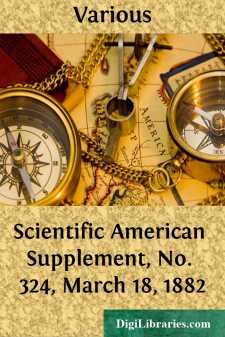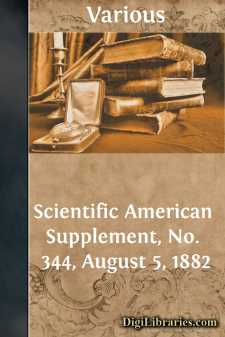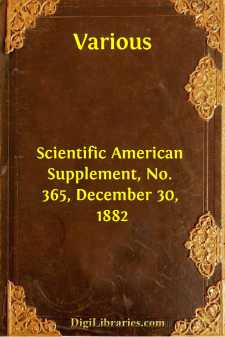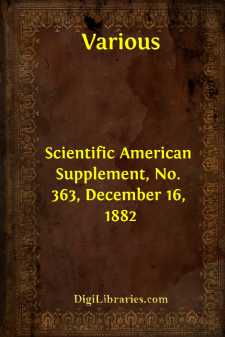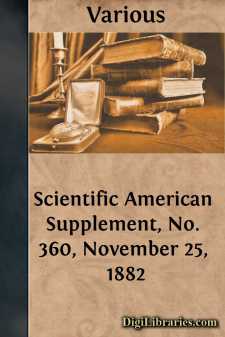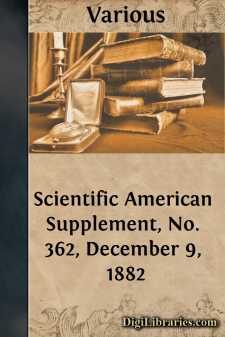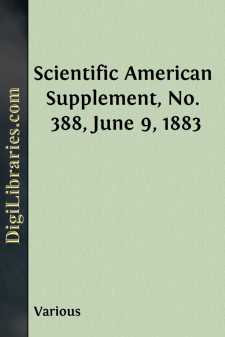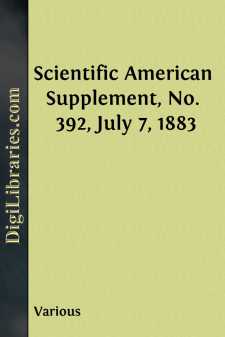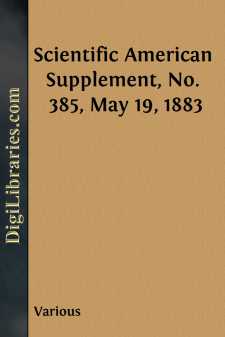Periodicals
- Art 27
- Children's periodicals 59
- Entertainment 5
- Food/Wine 2
- Games/Humor 455
- General 661
- Health 1
- History 53
- House/Home 1
- Regional 62
- Science/Nature
- Transportation 10
Science/Nature Books
Sort by:
by:
Various
MACHINE TOOLS FOR BOILER-MAKERS. We give this week an engraving of a radial drilling machine designed especially for the use of boiler-makers, this machine, together with the plate bending rolls, forming portion of a plant constructed for Messrs. Beesley and Sons, boiler makers, of Barrow-in-Furness. [Illustration: IMPROVED BOILER PLATERADIAL DRILL.] This radial drill, which is a tool of substantial...
more...
by:
Various
METAMORPHOSIS OF THE DEER'S ANTLERS. Every year in March the deer loses its antlers, and fresh ones immediately begin to grow, which exceed in size those that have just been lost. Few persons probably have been able to watch and observe the habits of the animal after it has lost its antlers. It will, therefore, be of interest to examine the accompanying drawings, by Mr. L. Beckmann, one of them...
more...
by:
Various
APPARATUS FOR MANUFACTURING GASEOUS OR AERATED BEVERAGES. The apparatus employed at present for making gaseous beverages are divided into two classes—intermittent apparatus based on chemical compression, and continuous ones based on mechanical compression. The first are simple in appearance and occupy small space, but their use is attended with too great inconveniences and losses to allow them to be...
more...
by:
Various
JAMES PRESCOTT JOULE. James Prescott Joule was born at Salford, on Christmas Eve of the year 1818. His father and his grandfather before him were brewers, and the business, in due course, descended to Mr. Joule and his elder brother, and by them was carried on with success till it was sold, in 1854. Mr. Joule's grandfather came from Elton, in Derbyshire, settled near Manchester, where he founded...
more...
by:
Various
When Sir Henry Bessemer, in 1856, made public his great invention, and announced to the world that he was able to produce malleable steel from cast iron without the expenditure of any fuel except that which already existed in the fluid metal imparted to it in the blast furnace, his statement was received with doubt and surprise. If he at that time had been able to add that it was also possible to roll...
more...
by:
Various
GUSTAVE TROUVÉ. The accompanying portrait of M. Gustave Trouvé is taken from a small volume devoted to an account of his labors recently published by M. Georges Dary. M. Trouvé, who may be said to have had no ancestors from an electric point of view, was born in 1839 in the little village of Haye-Descartes. He was sent by his parents to the College of Chinon, whence he entered the École des Arts et...
more...
by:
Various
THE BRITISH SANITARY CONGRESS. ADDRESS OF PRESIDENT GALTON. The Congress of the Sanitary Institute of Great Britain was opened inNewcastle on September 26. The inaugural public meeting was held in theTown Hall. Prof. De Chaumont presided, in the place of the ex-President,Lord Fortescue, and introduced Captain Galton, the new President. The President commenced his inaugural address by thanking, in the...
more...
by:
Various
FARCOT'S IMPROVED WOOLF COMPOUND ENGINE. In a preceding article, we have described a ventilator which is in use at the Decazeville coal mines, and which is capable of furnishing, per second, 20 cubic meters of air whose pressure must be able to vary between 30 and 80 millimeters. In order to actuate such an apparatus, it was necessary to have a motor that was possessed of great elasticity, and...
more...
by:
Various
IMPROVED DYNAMO MACHINE. The continuous current and the alternating current generators invented by Dr. J. Hopkinson and Dr. Alexander Muirhead are peculiarly interesting as being probably the first in which the bobbins of the armature were wound with copper ribbon and arranged on a disk armature much in the same way as was afterward done by Sir William Thomson and by Mr. Ferranti. In the...
more...
by:
Various
THE RAPHAEL CELEBRATION AT ROME. The most famous of Italian painters, Raffaele Sanzio, whom the world commonly calls Raphael, was born at Urbino, in Umbria, part of the Papal States, four hundred years ago. The anniversary was celebrated, on March 28, 1883, both in that town and in Rome, where he lived and worked, and where he died in 1520, with processions, orations, poetical recitations, performances...
more...


